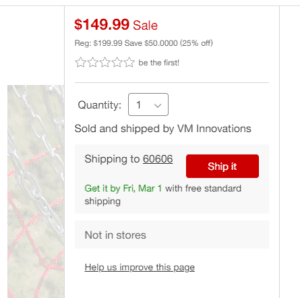Target Corp. on Monday launched Target +, an online marketplace that enables third-party merchants to sell on Target.com.
Target + will broaden Target.com’s assortment in some key categories, such as home furnishings, toys, electronics and sporting goods, the company says. For example, Target will now offer a wider range of running shoes, new musical instruments and baseball gear for all skill levels because of its marketplace merchants.
Marketplace products will be featured alongside Target’s own inventory on Target.com. While the company says it is still in the early stages of the marketplace, there seems to be some third-party sellers’ products already listed on the site. For example, on a product page for a Frisbee disc golf set, it says “sold and shipped by VM Innovations.” In the Shipping & Returns section of the product page, it says “the item ships from third party seller: VM Innovations.”

While sellers ship the products, Target will process returns both online and in its stores.
“Target + provides guests with a curated selection of product choices that enhance our existing assortment, with the perks they enjoy from Target, like 5% off with a Target REDcard, free shipping and easy in-store returns,” said Rick Gomez, Target’s chief marketing officer and digital officer.
The marketplace is invite-only. Target did not immediately respond to questions regarding the commissions and fees it is charging its sellers and how many sellers it currently has.
Target, No. 17 in the Internet Retailer Top 1000, has plenty of company among large retail chains launching their own marketplace. Others ranked in the Top 1000 that operate a marketplace include: Walmart Inc. (No. 3), Urban Outfitters Inc. (No. 39), J. Crew Group Inc. (No. 53), Albertsons (No. 178) and Crate and Barrel, which is owned by Otto Group (No. 80). Before Toys R Us shuttered, it also announced plans to launch a marketplace in 2018.
Of the 100 online marketplaces around the world ranked in the new 2019 Internet Retailer Online Marketplaces database, 32 of them have a hybrid model, which means they sell both their own inventory and third-party sellers’ inventory. The median portion of total gross merchandise sales coming from third-party marketplace sales is 49%, Internet Retailer estimates.
“As they invest in ecommerce, every retailer runs into a situation in which they need to find ways to engage with customers on a more regular basis and help them find what they’re looking for in a way that isn’t too costly, like owning inventory and handling the costs of storing and delivery,” says Adrien Nussenbaum, CEO of Mirakl. Mirakl sells technology that helps retailers and other companies operate marketplaces.
Expanded product assortment, speed to market with new products and higher ecommerce profitability are three reasons retailers launch marketplaces, according to Internet Retailer’s analysis. For more in-depth analysis and examples of how launching a marketplace has helped some retailers, read Internet Retailer’s 2018 edition of the Online Marketplaces report.
Favorite